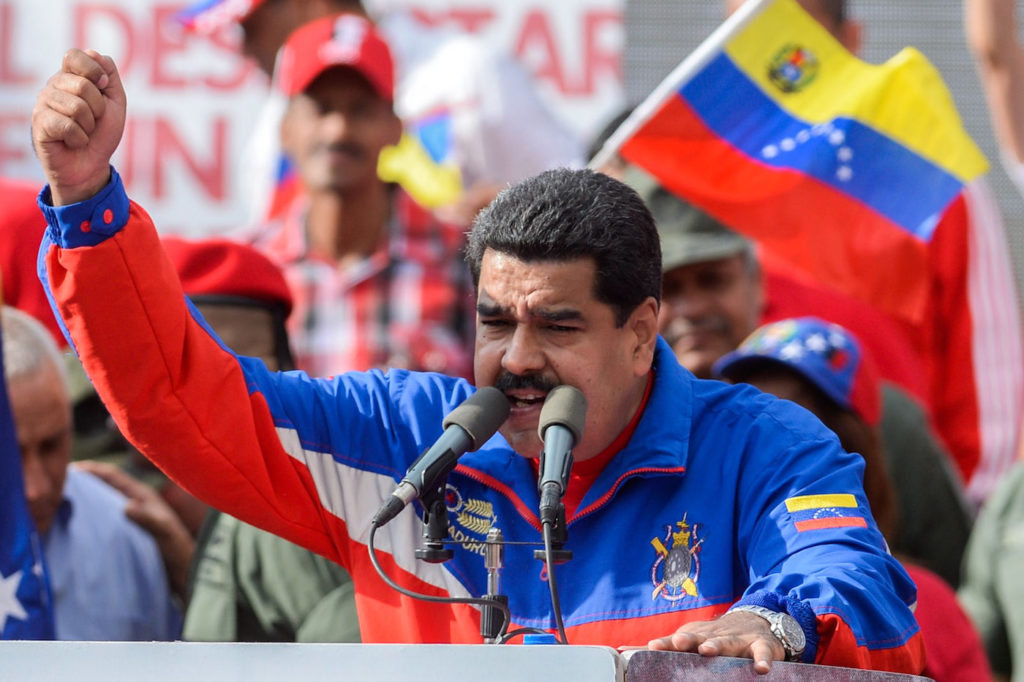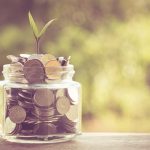I was only two years old when Hugo Chavez became President of Venezuela. Yet that moment has shaped not only my life’s path but the lives of millions of my fellow Venezuelans.
In 1998, a democratic and relatively open economy began a process of institutional transformation with the so-called “Bolivarian Revolution,” led by Presidents Hugo Chavez and Nicolas Maduro. Their economic and political “reforms” turned Venezuela into a totalitarian state, and their legacy has been the total and utter destruction of Venezuela’s economic, political, and social freedoms. Throughout my twenty-two years of life, I have seen the intense pain that Maduro’s repressive institutions have inflicted on my family, friends, and community.
Politically, Venezuela is a dictatorship that brutally represses its people. Maduro’s dictatorship controls the entire state apparatus as well as almost all media outlets. Under this system, Venezuelans lack fundamental political freedoms such as free elections, freedom of speech, and freedom of assembly.
Economically, the situation is even more disappointing. Today, 90 percent of Venezuelans live in poverty, 61 percent in extreme poverty. According to the International Monetary Fund, hyperinflation in Venezuela is expected to reach 10 million percent by the end of this year. As a result, Venezuela has the highest misery index in the world. Since 2013, our GDP per capita has declined by more than 50 percent, making Venezuela’s economic collapse twice the size of other economic catastrophes such as the Great Depression, the Spanish civil war, and the Greek crisis. In fact, Venezuela’s economic collapse is the worst in the modern history of the Western hemisphere.
Start your day with Public Discourse
Sign up and get our daily essays sent straight to your inbox.Venezuelans are suffering in ways most people in developed nations could not even imagine. Because of this, I think we economists sometimes need to go beyond economic indicators. We need to speak from our hearts about our experiences with our loved ones. Only by doing this can we truly communicate the social implications of an economic collapse of this magnitude. In this way, we can remind our readers that behind every policy brief and economic indicator are real people with families, friends, and aspirations. No economic indicator could ever do justice to the depth of the human suffering taking place in Venezuela today.
In this essay, I aim to humanize the Venezuelan collapse by sharing my personal experiences as a Venezuelan. I want to show you the social implications of Venezuela’s crisis rather than focusing on the economic theory behind it. I hope that you will be moved to support Venezuelans in our fight for freedom, and I encourage you to defend your freedoms in your country. Only when we are free to speak our minds, to follow our dreams, and to coexist peacefully with others are we able to do the things that make our lives worth living.
A Personal Experience
We all have vivid memories of our childhoods. In my case, most of them involve moments of joy with family and friends. These happy memories range from the simplest activities, such as playing tennis with my best friends, to special occasions, such as family trips.
Yet I think the difficult moments are the ones that really shape us. We are formed by the moments in which we feel powerless, the moments in which injustice seems inevitable, and the moments in which humanity feels very distant from the crude reality around us.
For me, the night of April 14, 2013 was one of those moments. In my memories of that night, I vividly recall a complete and terrifying silence in every room. On that day, Nicolas Maduro stole Venezuela’s presidential elections from Henrique Capriles, the democratic candidate. According to every exit poll, and every piece of research available, Capriles won the election that night. However, in countries like Venezuela, the will of a few generals counts more than the will of millions of people. That night was the beginning of the darkest period in the history of our country.
Since that moment, that moment full of frustration and pain, I decided to do something about this injustice. I began my journey as a person committed to restoring democracy in his country. At first, I became a member of a political party named Voluntad Popular (People’s Will). I was able to become their political coordinator in our municipality, and I was able to understand more about the reality of the poorest sectors of my city. It was frustrating to see that a resource-rich country like Venezuela had so much poverty, crime, and injustice. We tried to find solutions to the problems of our community. For instance, the vast majority of Venezuelans do not have clean water and electricity in their homes (if they have a home at all). However, it is impossible to fix Venezuela’s issues when the true problem is the government itself. Inflation, corruption, and economic mismanagement are all symptoms of a government that sees political power as its ultimate goal, not as a mean to help others.
By 2014, it was clear that Maduro’s government was destroying the economy, and the vast majority of Venezuelans wanted a political change. My party started to organize peaceful demonstrations throughout the country to pressure the government. The government responded by violently repressing the demonstrations. In just a few months, President Maduro incarcerated thousands of protestors and killed many of them. In response, millions of Venezuelans took to the streets demanding justice, which triggered more repression and violence. By early 2014, the political situation was clear: Venezuela had become a dictatorship, and Maduro’s regime was clearly willing to kill Venezuelans in order to remain in power.
As a result, my family and I made one of the most difficult decisions of my life. Staying in Venezuela was simply too dangerous for young political activists. I had to leave.
Once in the United States, I decided that I must use this time abroad to prepare myself academically. I was determined to understand in depth the institutional problems of my country. I went to college and studied economics. I studied in depth the history of my country, as well as the specific economic and political challenges that resource-rich countries face. Today, I am grateful to be able to read authors such as Douglass North, Milton Friedman, John Rawls, Dani Rodrik, and a fellow Venezuelan, Ricardo Hausmann. Their academic work has helped me understand the complexities and nuances of Venezuela’s situation.
I have also used this time here in the United States to spread the message of a free Venezuela. Since I came here, I have talked to everyone I could about what was happening in Venezuela. At first, I simply wanted to alert them about the dark side of ideologies that put the collective ahead of the individual. However, I quickly realized the importance of building international support for our cause. Thanks to organizations such as Students for Liberty, I have been able to speak at more than fifteen universities in the United States and Europe, such as New York University (NYU), Stanford, and Harvard. I am now the President of Venezuelan Alliance, a nonprofit committed to raising awareness about the importance of free and democratic institutions by explaining Venezuela’s repressive regime.
After almost two years of speaking at universities and spreading our message, our initiatives have paid off. Today, almost all democratic states in the world support our cause, and they are actively pushing for a political transition in Venezuela. This is extremely encouraging. I plan to continue my work, because I believe that every citizen of the free world needs to understand the reality of oppressed countries like Venezuela.
The Big Lesson I Want to Share Today
Alexis de Tocqueville wrote in 1856, “The man who asks of freedom anything other than itself is born to be a slave.” Almost two centuries later, I think this is one of the most important lessons I have learned from Venezuela’s collapse. Human dignity demands to be recognized through political, social, and economic freedoms—freedoms that are completely absent in Venezuela’s current political framework. Venezuela represents much more than an economic case study. It is a reminder of the immeasurable value of freedom in itself.
I think we often make the mistake of supporting free institutions solely for their economic results. Free and open societies do enable us to achieve individual and collective socioeconomic development, and that is important. However, utilitarian arguments are not enough. We must communicate why our ideas lead to a more just society.
On February 4th, 1992, Hugo Chavez led a failed coup d’état. That day, people died, and democracy moved one step closer to extinction. While the majority of Venezuelans defended their democracy by condemning Hugo Chavez’s actions, a growing sector applauded the coup. Former President Rafael Caldera was one of them. He argued that democracy meant nothing if people were hungry. His statement, in a resource-rich country with a history of militarism, represented the dangerous idea that human freedom was less important than material well-being. Caldera’s idea resonated with a large portion of the country, and it was partially responsible for the election of Hugo Chavez as president in 1998. In a Latin American context, this is a primary reason that our nation seems allergic to economic prosperity. In Latin American, material egalitarianism, as a political doctrine, has condemned our nations to higher levels of poverty, inequality, and injustice.
In Latin American, material egalitarianism, as a political doctrine, has condemned our nations to higher levels of poverty, inequality, and injustice.
These dark moments can help Venezuelans to really understand what type of country we want. After two decades of Chavismo, freedom will become non-negotiable.
I am not fighting this political fight to see my country turn to a less radical version of socialism. I believe in the deep transformation of my country. I believe in a country of freedom, with opportunities to fulfill our dreams. I believe in a country with true equality—not material egalitarianism, but equality under the law. I believe in a country with a just distribution of income, with the understanding that a fair distribution is only possible through markets, private property, and public policies that empower people, giving them the chance to succeed. Overall, I believe in a country in which every Venezuelan has the opportunity to live, study, and speak freely.
I hope that our story serves a lesson to the world. In 1944, Friedrich Hayek warned of the road to serfdom. Hayek wrote that “liberty is not merely one particular value but . . . the source and condition of most moral values. What a free society offers to the individual is much more than what he would be able to do if only he were free.” The story of Venezuela teaches us that this lesson is as important today as it was generations ago.













